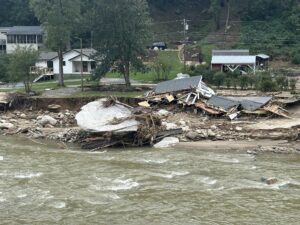Governor Josh Stein today (Feb. 3) requested $1.07 billion in state funding to support urgent rebuilding needs in western North Carolina.
The move came while legislators are investigating continued mismanagement in the state Office of Resilience and Recovery. More than $750 million has been spent by the NCORR since its inception after Hurricane Matthew in 2016 and its expansion after Florence in 2018. Hundreds of projects statewide are still not finished after contractors were ordered to stop work. (See related story)
Stein’s budget request includes funds to strengthen the economy, get people back into homes faster, repair infrastructure, support farmers, fix private roads and bridges, remove debris, and help school children stay at grade level.
“The people of western North Carolina have suffered tremendously since Helene swept through,” Stein said. “I appreciate what the General Assembly has done so far, but it’s time for us to step up and get them the money they need right now to rebuild. We can’t forget western North Carolina – and I will do everything in my power to ensure that the state shows up for them.”
Stein made his budget request at MANNA Food Bank, which works with over 300 community-based nonprofit food assistance partner agencies in 16 western North Carolina counties.
“MANNA has been an essential resource for the people it serves, and its work has become even more critical since Hurricane Helene struck,” said Stein. “As these organizations continue the daily work of supporting their community, we have a responsibility to support them.”

The governor’s budget request includes funding in a number of categiories, including economic development, infrastructure and local government support.
Two grant programs totaling $150 million would be set aside for businesses that suffered physical damage or significant economic loss, while $30 million in grants would go to small towns and counties to rebuild downtowns and other business districts.
VisitNC’s Economic Development Partnership division would receive $15 million to “support North Carolina’s tourism industry and to attract travelers and new businesses to the area.”
Revenue replacement grants of $100 million would go to local governments whose resources were exhausted by disaster response, as they work to keep water and sewer services going, pay law enforcement, and support school operations.
A major criticism directed toward former Gov. Roy Cooper and former President Joe Biden – and at Stein even before he took office – was a lack of housing.
Thousands of homes were destroyed in Helene’s flooding, and thousands of victims are still living in tens and campers after being denied assistance by the Federal Emergency Management Agency (FEMA) unless they agreed to sell their property and move elsewhere. President Donald Trump ordered the backlog of requests for assistance to be cleared as quickly as possible when he visited North Carolina after his inauguration. Trump also deployed National Guard troops and the Army Corps of Engineers within days of his visit, after Biden, Cooper and Stein announced that no further work was needed.
Stein’s request includes $150 million for a “Helene Home Construction and Repair Program” to immediately start rebuilding the estimated 5,100 homes; $25 million to support people struggling to afford rent, mortgage, or utility costs because their home or livelihood was affected; $10 million for Back@Home, a program that supports people who are without homes and provides them with case management support; $50 million in incentives for affordable housing construction; and $25 million to fill in gaps for home repairs that are not covered by FEMA.
Hundreds of miles of roads, bridges and other transportation infrastructure were damaged or destroyed during the storm. Complicating matters was that many of the bridges and roads in the hardest hit areas are privately owned, and provide the only way in or out of some properties. The governor’s request includes $75 million for private roads and bridges repair. While $12 million has been requested for debris removal, $25 million would be used to “clean up local parks and greenways”. $10 million would be assigned to “provide backup power for emergency operations and other critical infrastructure,” and $4 million to repair septic systems.
Farmers would receive $124 million in assistance, including $15 million for grants to farmers for verified uninsured losses to crops, livestock, aquaculture, and infrastructure; $100 million to help farmers clear debris and repair their land and waterways so they can resume production, and $19.4 million to prepare for the wildfire season and mitigate future risk of wildfires and flooding.
Stein received some criticism from lawmakers within minutes of the announcement Monday, since $2 million was requested for “college students who are struggling to pay tuition, fees, or emergency expenses that might force them to drop out of school at UNC Asheville, Appalachian State University, and Western Carolina University.” Another $34.2 million would go to districts that lost 15 or more days of school, so the systems could provide summer instruction and other support services.
Another $20 million would fund food banks in affected areas.
State legislators have already freed up millions in Helene relief, over Cooper’s veto, to jumpstart debris removal and infrastructure repair in the hardest hit areas.







